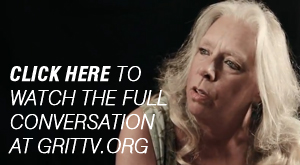New York’s forty-second Gay Pride Parade took place on Sunday, drawing tens of thousands of LGBT people and their allies. Alongside politicians—Mayor Michael Bloomberg, Governor Andrew Cuomo and City Council Speaker Christine Quinn—were celebrities, like Cyndi Lauper and her fellow grand marshals, Phyllis Siegel and Connie Kopelov, New York City’s first legally married same-sex couple.
Also marching Sunday, although less visible in the coverage, were scores of LGBT folks from New York’s homeless shelters, with union members and friends in a contingent led by Queers for Economic Justice. As Amber Hollibaugh, co-director of QEJ, put it in an interview this week, the LGBT movement may have come a long way, but there is a long way still to go.
“Is it different to come out now than it was to come out thirty-five years ago? Sometimes. But if you come out now and you come from poverty and you come from racism, you come from the terror of communities that are immigrant, or where you’re already a moving target because of who you are, this is not a place where it’s any easier to be LGBT even if there’s a community center in every single borough.”
QEJ works in places like shelter systems where the conventional chroniclers of LGBT life never go. “You would never know that there are queer people who are homeless, that there are low-income people that are LGBTQ and that we’re actually a majority of who shares that identity, not a minority,” says Hollibaugh.
Economics and sexual identity are not unconnected. The Center for American Progress reported back in 2010, “Besides disproportionate rates of homelessness as youth, a root cause of lower incomes and poverty among adult gay and transgender Americans is the high rate of workplace discrimination they face. This discrimination includes unequal pay, barriers to health insurance, unfair hiring and promotion practices, and verbal and sexual harassment that create hostile and unsafe working environment.”
As Steven Thrasher pointed out his stinger piece on "Gay Inc," the (LGBT) Human Rights Campaign honored Bloomberg with its National Ally Award last summer. To homeless LGBT New Yorkers it’s been a very strange sort of alliance. Homelessness in the city has risen a remarkable 49 percent on the mayor’s watch, in part, critics say, because of the cancellation of housing assistance programs. Homelessness in New York is now the worst since the Great Depression. According to the Coalition for the Homeless, a record-breaking 43,000 New Yorkers (including plenty of LGBTQ New Yorkers) make their bed in city shelters every night.
After the millions spent on gay marriage, will comparable money and political capital be spent next on working-class LGBTQ issues? There’s a glimmer of hope in groups like QEJ. After years of standing by Bloomberg, mayoral candidate and out lesbian Christine Quinn broke with Bloomberg finally to support a living wage. QEJ was among the many city groups that testified last October at hearings on the Living Wage Bill in the NY City Council. Quinn’s still blocking any vote on paid sick days. Says Hollibaugh:
 “Christine Quinn is a complication, I think, for many parts of the LGBTQ world. On the one hand, she has enormous power and visibility and she’s an open lesbian and…we have certain kind of access to her because she is an openly queer person. [On the other hand,] she wants corporate backing. If she wants corporate backing, she knows what the rules are for getting that corporate backing and she’s playing by those rules. If you are an LGBT organization that feels that economic justice and things like unions and minimum wages and family care are your baseline, she may be your ally, but she may also not return your call.”
“Christine Quinn is a complication, I think, for many parts of the LGBTQ world. On the one hand, she has enormous power and visibility and she’s an open lesbian and…we have certain kind of access to her because she is an openly queer person. [On the other hand,] she wants corporate backing. If she wants corporate backing, she knows what the rules are for getting that corporate backing and she’s playing by those rules. If you are an LGBT organization that feels that economic justice and things like unions and minimum wages and family care are your baseline, she may be your ally, but she may also not return your call.”
QEJ is having a summer fundraiser this week in NY (I’m on the host committee, and I invite you!) You can find out more at q4ej.org and watch my conversation with Hollibaugh at http://www.grittv.org.


